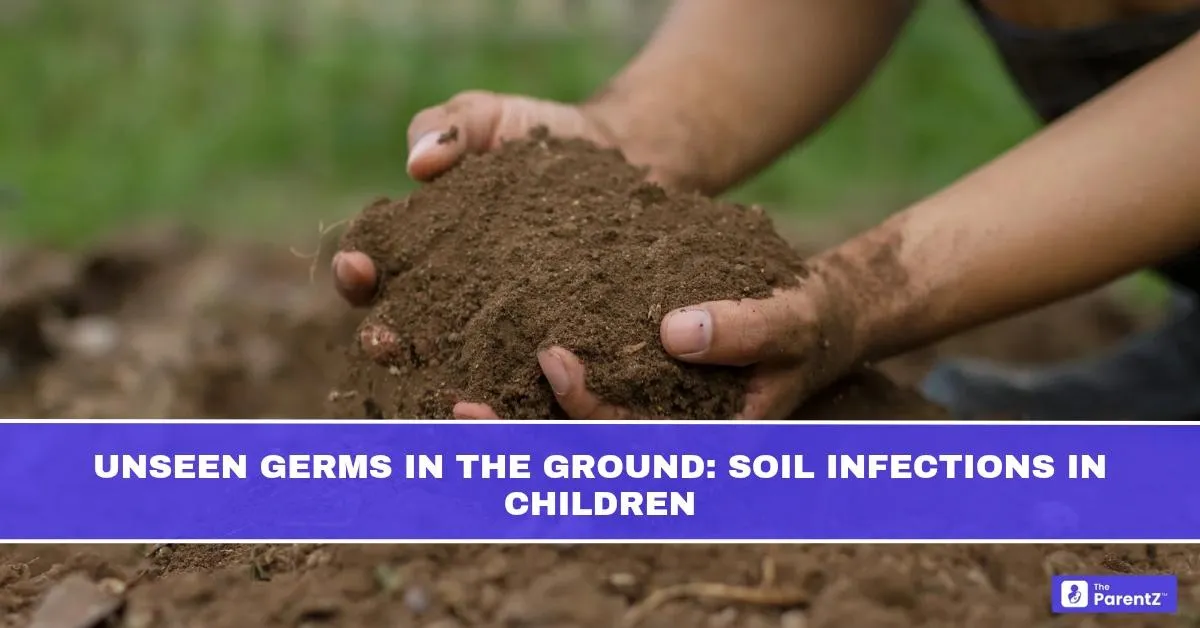Children enjoy outdoor play, and it is important for their health and development. However, soil often contains bacteria, viruses, fungi, and parasites that may cause illness. Understanding the common soil-borne infections, how they spread, and the ways to prevent them helps parents keep children safe without limiting their natural playtime.
1. Tetanus
Cause: Tetanus is caused by the bacterium Clostridium tetani, which lives in soil in the form of spores. When these spores enter the body through deep wounds, especially those contaminated with soil or rust, they release a toxin that affects the nervous system.
Symptoms: Painful muscle stiffness, difficulty swallowing, jaw locking, and spasms.
Prevention:
- Ensure that children receive the full course of tetanus vaccination as part of their routine immunization (DTaP).
- Clean all wounds thoroughly with soap and water.
- Seek medical attention for deep or dirty wounds, especially if tetanus vaccination is not up to date.
2. Worm Infections (Soil-Transmitted Helminths)
Cause: Worm infections, such as roundworm, hookworm, and whipworm, occur when children ingest worm eggs or larvae from contaminated soil. Walking barefoot or putting dirty fingers in the mouth increases the risk.
Symptoms: Stomach pain, diarrhea, anemia, poor appetite, weakness, and poor growth in severe cases.
Prevention:
- Give deworming medication to children as advised by a pediatrician, usually every six to twelve months.
- Encourage children to wear shoes or slippers when playing outdoors.
- Teach proper handwashing with soap and water after outdoor play and before meals.
- Keep nails short and clean to avoid soil accumulation.
3. Fungal Infections
Cause: Certain fungi, such as Histoplasma, are present in soil, especially soil mixed with bird or bat droppings. Spores of these fungi can become airborne when soil is disturbed and may be inhaled by children.
Symptoms: Fever, cough, chest pain, and difficulty breathing. Symptoms may resemble a chest infection.
Prevention:
- Avoid letting children play in areas with heavy dust, old construction sites, or soil contaminated with bird or bat droppings.
- Use masks if exposure to dusty soil is unavoidable.
- Seek medical care if a child develops respiratory symptoms after exposure to such environments.
4. Bacterial Skin and Wound Infections
Cause: Bacteria such as Pseudomonas and Staphylococcus species are commonly present in soil. They can infect even small scratches, thorn pricks, or insect bites if the wound is not cleaned properly.
Symptoms: Redness, swelling, pus formation, pain, and fever in severe cases.
Prevention:
- Always clean cuts, scratches, and insect bites with soap and water.
- Apply an antiseptic and cover the wound if needed.
- Watch for signs of infection such as increased pain or pus and seek medical help early.
- Encourage children not to scratch wounds with dirty hands.
5. Other Rare Soil Infections
- Leptospirosis: Caused by bacteria found in soil contaminated with animal urine. It can spread if children play in muddy water or wet soil. Prevention includes avoiding stagnant or muddy areas, especially after rain.
- Nocardiosis and Mycetoma: Rare bacterial infections that occur in tropical regions when soil bacteria enter through skin wounds. Prevention includes proper footwear and wound hygiene.
General Prevention for Parents
- Ensure that all vaccinations, especially tetanus, are up to date.
- Practice regular deworming as recommended.
- Encourage children to always wash their hands after outdoor play.
- Provide protective footwear during outdoor activities.
- Trim nails regularly and discourage nail-biting or thumb-sucking.
- Clean and dress all wounds promptly and monitor for signs of infection.
Conclusion
Soil is a natural part of a child’s world, and outdoor play should never be discouraged. However, parents need to remain aware of soil-borne infections. By recognizing the risks and following simple preventive measures such as vaccination, deworming, proper footwear, hygiene, and wound care, children can continue to explore, play, and grow safely.





Be the first one to comment on this story.